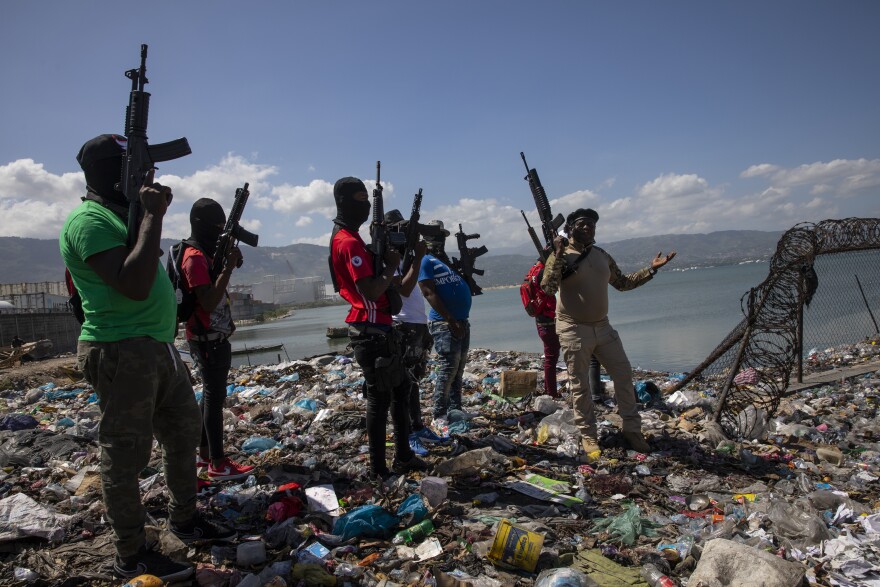COMMENTARY Vigilantism is an understandable response to relentless violent crime, but Latin America has shown it only worsens the plague — as it likely will in Haiti if the world doesn't step up.
A note to the international community that can’t figure out what to do about Haiti: vigilantes aren’t going to do your work for you there. If anything, they’ve just made it much, much harder.
Here’s what we know for sure about what happened in the Canape Vert section of Port-au-Prince, Haiti, on Monday: a furious mob pulled 13 young men suspected of being gang members from a bus, then beat and burned them to death with flaming tires as they pleaded for their lives.
Here’s what we don’t know for sure: that those 13 young men were actually guilty of anything that warranted their arrest, let alone their ghastly summary executions in the middle of a street.
Chances are they had indeed taken part in the brutal murders, ransom kidnappings and hijackings of food, fuel, medicine and other necessities that the gangs ruling so much of Haiti today commit almost daily. But they might not have. Either way, that wasn’t an angry horde’s call to make.
READ MORE: Latin America can no longer deny the awful reality of gang-wing government
No matter. In the aftermath, the AP reports Canape Vert residents have formed neighborhood patrols, armed with machetes and other crude weapons, spray painting “Down With Gangs” on walls and trucks. Residents in other neighborhoods of the capital feel emboldened to do the same. And what happened Monday is more than likely to happen again. Soon.
It’s understandable to interpret all this as weary, terrorized Haitians taking back their streets. Rising up against the criminal gangs that are Haiti’s de facto government now amid the utter collapse of the country’s institutions. Filling its appalling police vacuum and restoring law and order.
It’s natural to want to see this as a prelude to the heroic, citizen-driven return of rule of law in Haiti.
But to anyone who might be indulging that hope — especially an international community that’s been standing on the sidelines these past few years as Haiti spirals into the gang abyss — I have bad news for you. It's more likely that this is a harbinger of the further collapse of rule of law in that country. That it’s part of a deteriorating cycle, not an encouraging watershed. And the reality of the past generation in Latin America and the Caribbean supports that warning.
The ghastly vigilante executions of gang suspects aren't likely a harbinger of Haiti's return to rule of law — they're more an omen of its deeper collapse.
Let me take you back to the Mad Max crime that stalked Venezuela in the 1990s. One day in 1992, I was talking with a resident in front of his house in Caracas’ Catia slum. Nearby a kid — he couldn’t have been more than 12 — started firing a revolver at another group of armed kids who also couldn’t have been more than 12. A bullet ricocheted off the doorway inches from where I stood. For me it was a close call; for the resident, it was Tuesday in Caracas.
Unhinged exasperation
Eventually, that made fed-up — but otherwise decent — Venezuelans morph from violence victims into violent vigilantes. In their country’s desperate absence of serious law enforcement, many deputized themselves to play judge and executioner of the thugs they caught, including a teen who they said killed another for his Nike sneakers. The suspect was found hanged from a bridge in Catia one morning after being beaten so savagely by a mob he was unrecognizable.

Later, some of them would tell me their acts of reprisal horrified them as much as they did the rest of us. But here’s the more important thing they shared: they thought their extreme action would mark a turning point — that the unhinged national exasperation it displayed would surely usher in a credible police and justice corps. It’s a big reason they elected leftist strongman Hugo Chávez President in 1998.
Instead, Venezuela’s violent crime got darker and more widespread. In 2015, Caracas registered the world’s highest homicide rate. That wasn’t despite the vigilantism of the 1990s; it was likely because of it. Vigilantism simply helped normalize the criminal plague, because vigilantism itself is a violent crime.
The same has happened elsewhere in Latin America and the Caribbean — especially Mexico — where rule of law is all too often a meaningless term.
And it’s bound to repeat itself now in Haiti. That is, unless the international community finally gets serious about helping Haiti confront the gangs that Haiti alone — and vigilantes alone — can't defeat.






